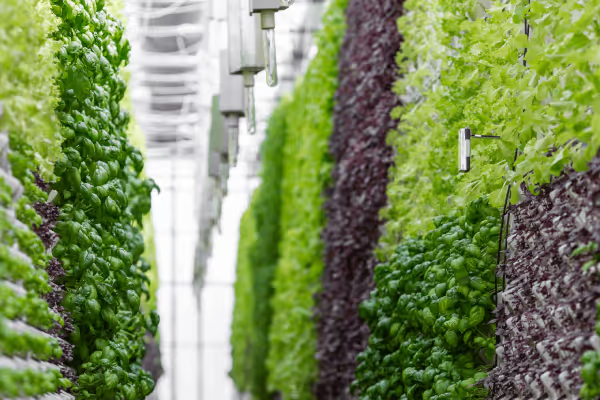
Vertical Farming and Water Conservation: Growing More with Less
In a world facing rapid population growth, urbanization, and climate change, agriculture must evolve to meet the increasing demands for food, water, and land. One of the most exciting and innovative approaches in this area is vertical farming, which uses vertical space to grow plants in controlled conditions. This farming method has the potential to bring about significant changes in how we produce food, especially in the context of water conservation, which is becoming an increasingly critical resource.
What is Vertical Farming?
Vertical farming is a method of growing plants in vertical layers in urban environments using systems such as hydroponics, aeroponics, and aquaponics. This method allows farmers to maximize limited space within enclosed structures such as greenhouses, factories, or even multi-story buildings. In vertical farms, plants grow in layers, on shelves, or within different types of grid systems, where each layer is optimized for specific growth conditions.
One of the main reasons why vertical farming is considered a sustainable solution is its ability to significantly reduce the consumption of natural resources, particularly water, which is a critical factor in global agriculture.
Water Consumption in Traditional Agriculture
In traditional agriculture, water is a vital resource, but it is often used in unsustainable ways. Farmers worldwide use massive amounts of water for irrigation, which can lead to significant losses due to evaporation, runoff, or overwatering. In some regions, particularly in dry areas, excessive water use for irrigation can lead to the depletion of groundwater and reduced soil fertility. This problem is further exacerbated by climate change, which brings unpredictable weather patterns, including more frequent droughts and floods. On a global scale, agriculture accounts for about 70% of total water consumption, with the majority of this water being used for irrigation. Therefore, it is crucial to consider sustainable methods of water management to ensure long-term food production without compromising natural resources.
How Vertical Farming Helps with Water Conservation
One of the key advantages of vertical farming is the optimization of water consumption. In vertical farms, plants are often grown in hydroponic or aeroponic systems, which allow precise control over the amount of water used for their growth. These systems enable water recycling and reuse, which significantly reduces the need for additional irrigation.
Vertical farming contributes to water conservation in several key ways: Hydroponics, aeroponics, and aquaponics are innovative systems in vertical farming that greatly improve water efficiency and reduce water loss. In hydroponics, water enriched with nutrients circulates through pipes and channels, while in aeroponics, plants grow in the air, with water being dispersed as a fine mist, minimizing loss and allowing efficient resource recycling. Aquaponics integrates plants and fish in a symbiotic relationship, where fish provide nutrients for the plants through their waste, while plants filter the water, keeping it clean for the fish. All of these systems allow for continuous water recycling, significantly reducing the need for constant replenishment and contributing to agricultural sustainability.
Vertical farming contributes to water conservation in several additional ways, further enhancing its sustainability and efficiency in managing water resources.
- Closed Water Cycle: Vertical farms often use closed-loop systems, where water is collected after it has been used by plants and is then recycled. This approach greatly reduces the need for frequent addition of fresh water, unlike traditional irrigation systems that result in significant losses due to evaporation and runoff.
- Precise Irrigation: Vertical farms utilize advanced technologies for precise irrigation, such as moisture sensors and automated systems that control the amount of water used. This ensures that water is delivered in exactly the right quantities, minimizing waste and maximizing resource efficiency.
- Customized Growing Conditions: Vertical farms allow for precise control over all factors needed for optimal plant growth, including light, temperature, humidity, and, of course, water. This precision in environmental control ensures maximum efficiency in the use of all resources, making vertical farming an exceptionally sustainable solution for the future.
- Reducing Evaporation: In traditional agriculture, especially in arid climates, water is quickly lost due to evaporation. However, vertical farms, which are often housed in closed spaces or greenhouses, minimize this water loss. The effects of climatic factors on soil moisture are nearly eliminated, allowing for more efficient use of water resources.
Ecological and Economic Benefits
Vertical farming brings significant ecological and economic benefits, especially in the context of water conservation and reducing the environmental impact. By using drastically less water, vertical farms not only reduce pressure on precious water resources but also significantly decrease carbon emissions often associated with food transportation and fossil fuel consumption. The efficient water management in these systems, along with recycling and reduced waste, contributes to sustainability and resource conservation at a time when water has become one of the most important global issues.
In addition, vertical farms can significantly reduce food production costs, making food more affordable and sustainable, especially in urban areas where agricultural space is limited. These systems enable food production in places where traditional farming would be challenging or even impossible, such as urbanized areas, regions with poor soil quality, or areas experiencing prolonged droughts. Given all these benefits, vertical farming not only reduces dependence on food imports and transportation but also contributes to more stable, local, and environmentally friendly food production systems.
Vertical Farming as a Solution for Water Conservation
Vertical farming represents a powerful strategy for addressing the modern challenges of agriculture, especially in the area of water conservation. By utilizing innovative systems like hydroponics, aeroponics, and aquaponics, vertical farms enable efficient water use, reduce losses, and increase productivity, particularly in urban environments and arid regions. The ecological and economic advantages of vertical farming make it a crucial component of sustainable agriculture for the future. At a time when water resources are becoming increasingly precious, this innovative system offers a concrete solution for producing food with less water, less land, and less energy, making agricultural production more efficient and less dependent on natural resources.






